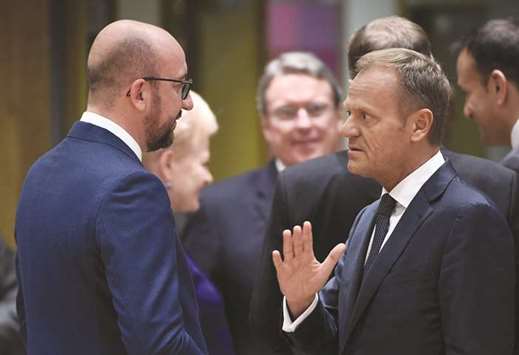Under intense pressure on all sides since losing her parliamentary majority, May said her task at the Brussels summit would be to set out her plans to protect EU citizens’ post-Brexit rights.
But Merkel, Europe’s most powerful leader, made clear that this was not at the top of her agenda as she reaffirmed Berlin’s strong ties with France and its newly elected President Emmanuel Macron.
“For me the shaping of the future of the 27 is a priority coming before the issue of the negotiations with Britain on the exit,” Merkel said, referring to the number of EU nations minus Britain. “We want to conduct these negotiations in a good spirit but the clear focus has to be on the future of the 27.”
Macron, attending his first summit, did not mention Brexit directly but said that it was now time to get down to concrete work – “hand-in-hand with Germany” – on putting the European Union back on track after years of austerity and crisis.
“We have to establish our own strategy based on our own interests,” Macron said.
Britain’s vote to leave the EU exactly a year ago today was the biggest in a series of shocks that the bloc has faced, but it now insists it is turning the corner on anti-EU sentiment.
Britain on the other hand is mired in fresh debate with supporters of a so-called soft Brexit that would involve staying in the EU’s single market.
May was set to brief EU leaders on her Brexit plans over dinner last night, before being kicked out while the remaining 27 discuss key issues including the future location of the EU’s medicines and banking agencies, currently based in Britain.
For her part, May said she would set out “clearly how the UK proposes to protect the rights of EU citizens in the UK and see the rights of UK citizens living in Europe protected”.
The fate of an estimated three 3mn Europeans living in Britain and around 1mn Britons living elsewhere in the EU was thrown into doubt by Britain’s vote to leave the bloc last year.
“That’s been an important issue, we’ve wanted it to be one of the early issues that was considered in the negotiations, that is now the case, that work is starting,” May told reporters as she arrived.
May had previously refused to guarantee the rights of EU citizens in Britain until those of expatriate Britons were secured.
The issue of citizens’ rights is one of three priorities in the Brexit talks which began on Monday, along with Britain’s estimated €100bn (£88bn, $112bn) divorce bill, and the fraught question of Northern Ireland, which will be on Britain’s only land border with the EU after Brexit.
Earlier, EU president Donald Tusk had channelled John Lennon’s Imagine as he said he hoped Brexit could be reversed – though others immediately poured cold water on the idea.
“Who knows? You may say I am a dreamer, but I am not the only one,” the former Polish premier added with a broad smile, quoting Lennon’s iconic song.
But Belgian Prime Minister Charles Michel – who has strongly argued for EU unity on Brexit – said that Tusk should let it be.
“I am not a dreamer and I am not the only one,” Michel told reporters, saying that he thought it was “British humour” by Tusk.
Tusk insisted meanwhile that the remaining 27 members had a renewed sense of optimism about the bloc’s future after years of crisis and mounting anti-EU sentiment, which culminated in the Brexit vote.
“Never before have I had such a strong belief that things are going in a better direction,” he said.
In Brussels, security has been stepped up after Tuesday’s failed bomb attack at one of the city’s main rail stations by an Islamic State (IS) sympathiser, following strikes in Britain and France.
Tusk said leaders were all deeply concerned by the issue and agreed that if social media companies could not help prevent online radicalisation and hate-crime, then they were ready to introduce legislation to make them do so.
Leaders also endorsed the EU’s growing efforts to build up defence capabilities, especially amid concerns about US President Donald Trump’s commitment to transatlantic ties.
Meanwhile Macron and Merkel are expected to recommend another six-month rollover of tough economic sanctions imposed against Russia in 2014 over the conflict in eastern Ukraine, which has claimed 10,000 lives.

